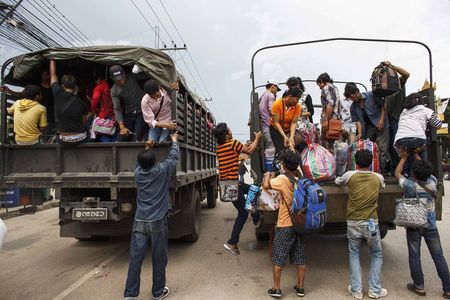By Amy Sawitta Lefevre
BANGKOK (Reuters) - Thailand's junta denied on Monday that they were pursuing a "sweep and clean" policy of driving illegal foreign workers out of the country, despite mass departures by fearful Cambodians since the military took power last month.
The International Organization for Migration (IOM) estimates that more than 100,000 undocumented Cambodian men, women and children have fled Thailand amid fears of a crackdown on illegal labour sine the May 22 coup.
The military's ruling National Council for Peace and Order (NCPO) insists Cambodians are leaving of their own accord and said 60,000 had crossed the border as of Saturday. It estimates there were 90,000 illegals in Thailand.
Highways leading to the Cambodian border were packed on Sunday with trucks and buses full of Cambodian workers opting to head home rather than face any confrontation with Thai authorities.
"The NCPO has no policy to sweep and clean, but teams must go to areas where there are illegal labourers to organise and manage the foreign work force as we have accumulated problems over the past 10 years," NCPO spokesman Winthai Suvaree told Reuters.
"We ask that those who employ foreign workers continue their activities as normal and maintain good order."
Cambodia's Foreign Ministry said it would ask Thailand to ensure better treatment for those leaving.
"We request that they send workers in a humanitarian way, or without prosecuting, and facilitate the legalization of undocumented workers," said ministry spokesman Kuy Kuong.
Rights groups told Reuters they were unaware of departures by the more numerous community of migrant workers from Myanmar.
The exodus could prove disastrous for the Thai economy, which relies heavily on foreign workers, mainly from Laos, Cambodia and Myanmar, to perform jobs most Thais are reluctant to do, including manual labour and domestic work.
Army chief General Prayuth Chan-ocha seized power in a bloodless coup following six months of street protests aimed at overthrowing Prime Minister Yingluck Shinawatra.
Her brother, former premier Thaksin Shinawatra, who was ousted by the military in a 2006 coup, was seen by many as the power behind the Yingluck government and as the most divisive politician in recent Thai history.
Thailand has been split for a decade between supporters of Thaksin and his policy of welfare benefits in the north and northeast and Bangkok-based royalist groups that accuse him of rampant vote buying and nepotism.
Despite a long history of enmity between Thailand and Cambodia, Cambodia's veteran leader, Hun Sen, became a close ally of Thaksin during his more than five years as premier.
Several leaders of the pro-Thaksin "red shirt" movement have sought refuge in Cambodia after bouts of turmoil in Thailand, including after last month's coup.
It remains unclear, however, whether any downturn in ties played a role in the mass departures. Thailand's Foreign Ministry denied they were linked to politics.

"With Cambodia we have very good relations. They know that the rumours are unfounded and caused a lot of panic," ministry spokesman Sek Wannamethee told Reuters.
"Cambodia has worked with Thailand to clarify to those going home that there is no threat to them here."
(Additional reporting by Pracha Hariraksapitak and Prak Chan Thul in PHNOM PENH; Editing by Ron Popeski and Nick Macfie)
